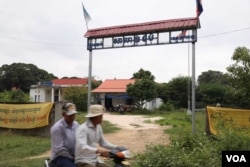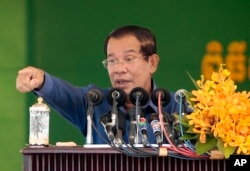Five months ago, Chin Choy was elected as a commune councilor for the Cambodia National Rescue Party, part of an influx of opposition officials into local administrations that was unprecedented in Cambodia’s modern history.
The opposition suddenly controlled 30% of all communes after the June 4 elections, up from only around 3% before, while winning 43.8% of the popular vote. In Champey, a semi-rural community of around 6,700 villagers, the ruling Cambodian People’s Party went from having a majority to being in the minority, as the opposition won three seats and the ruling party just two.
Now, the balance has abruptly shifted once again after Mr. Choy defected to the CPP last month.
He decided to jump ship and join the ruling party just a day after Prime Minister Hun Sen on October 22 put out a nationwide call for opposition officials to defect.
The premier said the offer was part of a second “win-win policy,” referring to his famous 1990s defection drive that allowed Khmer Rouge officials to switch allegiance while retaining their government and military positions and the resources they had accrued. Those who failed to defect often lost their rank and status.
The revival of the “win-win” concept is part of a government campaign for electoral primacy that has combined repression with inducements, starting shortly after the June commune elections. Most significantly, opposition leader Kem Sokha was abruptly jailed in early September and charged with treason for supposedly colluding in a US-backed plot to take over the government. A month later, the government filed a lawsuit with the Supreme Court asking for the CNRP to be dissolved completely due to its association with the treason case.
Ou Virak, a political analyst who heads the Future Forum, a Phnom Penh-based think tank, said that the commune elections were a “wake-up call” for the ruling party.
“The results of the commune elections indicated that the game by the opposition seemed to be a lot more serious, and that seemed to be the last straw in a sense, and what we are seeing today is that the ruling party is a bit nervous,” he said.
The CPP has long prided itself on having the best ground game in the country, with networks of support that stretch deep into local life. It has completely dominated commune councils since they were revived in 2002. In Champey commune, the CPP’s headquarters stands directly next to the commune office, noticeably larger and nicer than the public building, while the CNRP does not even have an office there.
Still, that pride was shaken in June when the CNRP took control of around a third of the country’s communes. In Takeo province, the CNRP won control of just 18 communes, with the other 82 going to the CPP, but over 300 CNRP commune councilors were elected out of 700 total, a significant gain.
So far, only 40 of the CNRP’s local officials nationwide have defected, along with one lawmaker, according to Meng Sopheary, the party’s head of electoral affairs. But those numbers could rise in the two weeks remaining before the Supreme Court hearing on whether to dissolve the party.
Mr. Virak said the drumbeat of press surrounding the push to dissolve the opposition, combined with seeming disarray at the national level of the CNRP and a lack of leadership in Mr. Sokha’s absence, made more defections very possible.
“If people are led to believe that the party will be dissolved, they will make these kind of decisions,” he said.
“Looking at the current pressure and rhetoric, it’s just positioning, pressuring people to jump ship and weaken the CNRP, so even if the CNRP is not dissolved, if most of the people believe it will be dissolved, it will be completely weakened and no longer a potential chance to take power, and then many people might jump ship,” he added.
Mr. Hun Sen famously made use of this divide-and-conquer tactic in the 1990s, when he subdued the remnants of the Khmer Rouge by pitting them against each other while luring them to the CPP with various blandishments and promises of local control.
At the same time, membership in the Khmer Rouge was outlawed and it was branded a criminal organization, raising the risk of remaining within the movement. Similarly, the upcoming Supreme Court decision could render it effectively illegal to be associated with the CNRP.
Ms. Sopheary, the CNRP official, said the few dozen defections thus far were due to a combination of intimidation on one hand and incentives on the other.
“I don’t think defection [to the CPP] is really from people’s hearts, like when they join the CNRP,” she said.
Sok Eysan, the CPP’s spokesman, insisted this was not true and that everyone who jumped to the ruling party did so for purely disinterested reasons.
“The CPP does not have a culture of giving money and things and intimidating people for defection,” he said.
In an interview this week at his house in Champey commune, Mr. Choy, 65, gave little insight into the state of his heart, but he said the ruling party had promised him that if he defected and did well as a CPP representative, he would be promoted to commune chief or even district councilor. On the other hand, he knew that he would soon lose his job and $160 monthly salary if the CNRP were dissolved.
So on October 23, he signed a letter that was sent to the CPP and swiftly circulated on party-aligned media outlets, saying that the opposition did not serve the people as “robustly” as the ruling party, and that Kem Sokha, his former boss, was a national traitor.
He did not discuss the decision with his fellow CNRP officials, or even his wife.
Sitting near her husband under their stilted home, Som Rain, 63, said she had not wanted her husband to join the CPP, but he failed to inform her of his plan ahead of time.
“In my mind, I thought that if CNRP is dissolved, I would ask him to quit [politics] and stay home and be an ordinary citizen, going to the pagoda,” she said, adding that she was afraid that the other villagers in Champey would begin to hate her husband.
“I meet people and they now less talk to me,” she said.
One person who feels particularly betrayed is the chief of Champey commune, Phorn Thlang, 52. He entered politics at Mr. Choy’s behest in 2007, joining the Human Rights Party, a predecessor to the CNRP founded by Kem Sokha.
“I am so surprised that he left the party without discussing it with us,” said Mr. Thlang, who said he would refuse to defect even knowing he might lose his commune chief position and the $222 monthly salary that comes with it.
Champey suffers from a lack of water for irrigation, an issue that Mr. Thlang said motivated many voters to pick the CNRP. He said defecting so soon after the election would be a clear violation of the will of the people.
“I don’t want to damage my honor,” he said. “I don’t want to go places and have people curse me. My pride depends on people who trust me.”
Villagers interviewed on Wednesday agreed, saying they were unhappy with the defection.
Touch Neang, 49, a villager who lives nearby Mr. Choy’s house, said it was wrong for him to join the CPP since people voted for him under the premise that he would represent the opposition.
“People lost confidence and trust in him,” he said. “I don’t have any confidence in him. I trusted him, but now he did that.”
Mr. Choy, however, insisted that he would continue doing his job—and might even have an easier time doing it as a member of the wealthy ruling party, making the defection a win-win.
“I will be regretful if I cannot help people when leaving the CNRP to join the CPP. I am still the deputy commune chief, and I will try to ask the upper level to develop our commune,” he said.
“Don’t lose hope in me.”
(Additional reporting by Julia Wallace)











